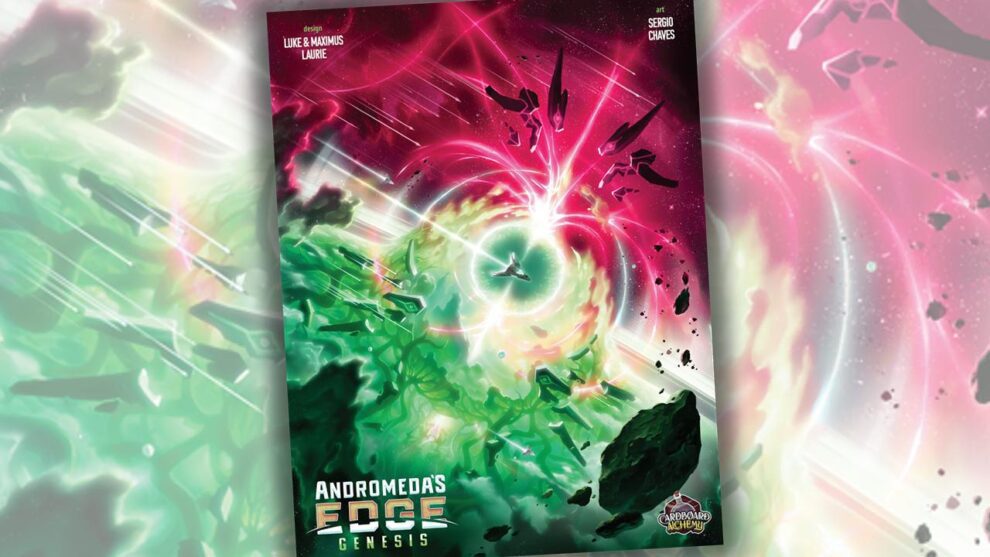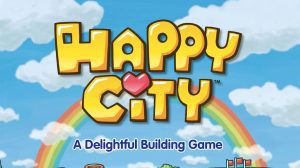Disclosure: Meeple Mountain received a free copy of this product in exchange for an honest, unbiased review. This review is not intended to be an endorsement.
If I’m being honest, the first day of Gen Con 2025 proved to be a slow news day.
Sure, it was crowded on the Gen Con floor in Indianapolis; lots of shoppers were toting away fresh goodies and novel wares. However, as a media member who had already played (and certainly heard about) the hottest games at the show, I was mostly tasked with running around to meet with publishers and marketing teams about the games that will be coming to next year’s Gen Con.
However, there was an exception during my first meeting at the show. I stopped by the Lucky Duck Games booth to see if they had any copies of an expansion to Unconscious Mind. They did not, but our rep Risa pointed me to the Cardboard Alchemy tables outside of the expo hall, for a different, and ultimately more important, announcement, as one of Lucky Duck’s partners.
“You know that Luke Laurie is here to show off the new Andromeda’s Edge expansion, right?”
My heart took off. I knew the expansion was in the works but didn’t know that the game was going to be at the show, with the co-designer in the mix to talk through the new components and gameplay of the expansion. I made a beeline to the Cardboard Alchemy area, and bam, right in front of me, was the expansion—two prototype copies of Andromeda’s Edge: Genesis were being taught and later played by other diehards smart enough to book tickets for the demos over Gen Con weekend.
A big thanks to Peter, Luke, Rozie, and the Cardboard Alchemy team for sending me home at the end of the show with one of the prototypes to put the new stuff through its paces. Here’s the executive summary: any excuse to play more Andromeda’s Edge is the right reason to buy this expansion, but one specific part of this expansion is the reason you should drop some coin as soon as the campaign launches.
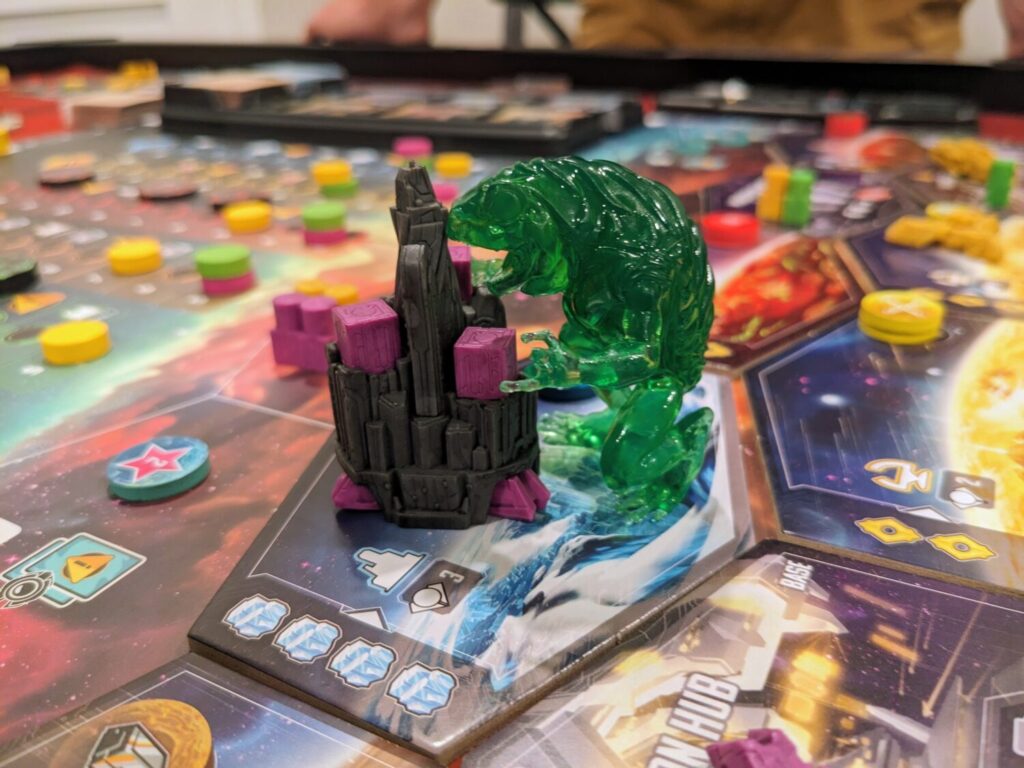
“Oh, Sorry, I Meant the OTHER Cosmic Frog”
Andromeda’s Edge: Genesis is an expansion to Andromeda’s Edge, which many gamers know is the updated version of the same core system from Dwellings of Eldervale. Dwellings was my favorite game from 2020 and a game that typically hovers in the top 150 games of all time on BGG. For more information on the Andromeda’s Edge base game, as well as some thoughts on why it was my #2 gaming experience of 2024, check out my original review or my top 10 games article.
Like other expansion reviews, I’ll talk briefly about each of the new game elements and some initial thoughts. This is based on three plays (one solo play and two three-player games) of the new expansion elements.
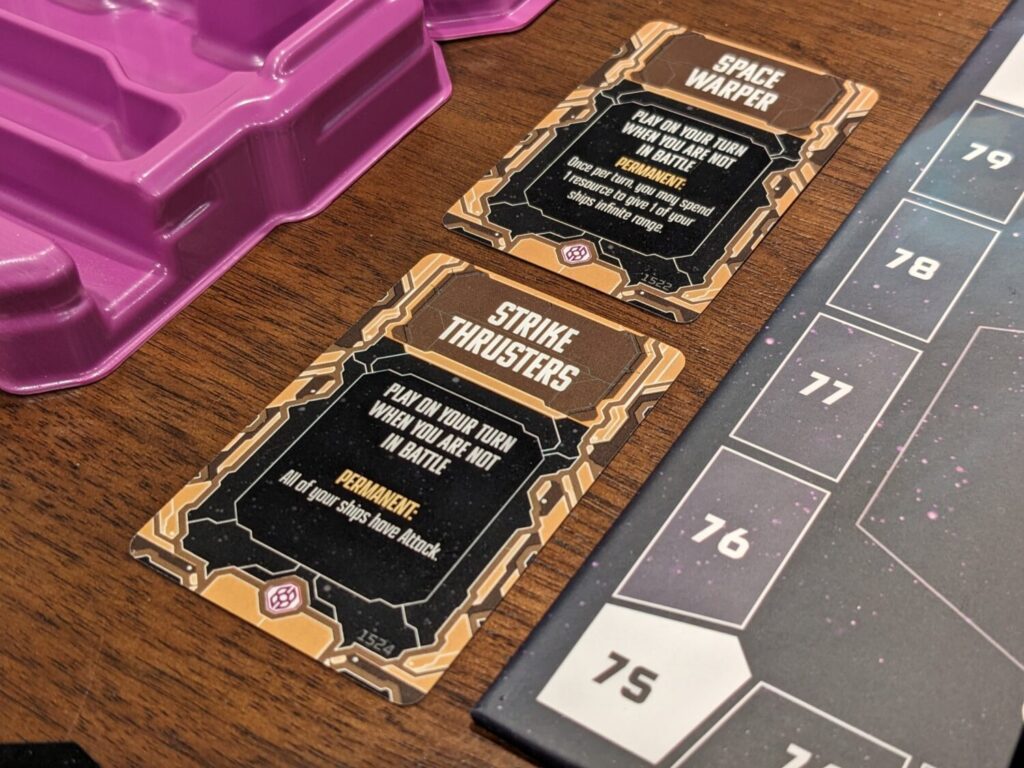
The Exotech Cards and the Innovation Hub
In Genesis, the Shipyard tile (the one that lets you build ships or repair ships and/or modules) has been replaced by the Innovation Hub. The Innovation Hub acts like a base tile, with three different options:
- Spend any resource to perform two repairs
- Spend a credit and any resource to upgrade a ship (which might allow a player to build a free ship, just like in the base game)
- Draw one Exotech card
Before we talk about the Exotech cards, a note about the other actions on this tile. I love that there’s a place to burn a resource (which, in this expansion, has always been a Tactics card I couldn’t make much use of) to do a double repair, since I often find myself taking modules that enter the game damaged. This offered a nice amount of flexibility since I hate doing much repair work before the Return to Station action when I’m out of ships.
But the gold mine here is the ship upgrade action. In one of my games, I ignored the brown track (Industry) and did all my ship upgrades via card effects or the Innovation Hub. I love that there’s an easy workaround to this action now on the board, which makes the Innovation Hub a much hotter location than the Shipyard.
And that’s before talking about the Exotech deck.
Laurie shared during the demo teach that Exotech cards are essentially 1.5 times as powerful as normal Tactics cards. In my experience, some of the Exotech cards are fine…and some of them are ridiculous. Some of them grant players the Voyage ability (the power that lets a ship fly into nebulae spaces) to all of their ships, not just the USS Enterprise-looking Science Vessel. And that ability might be granted for not just a single action, or an entire stretch between recall actions, like Sustain is used in the base game. We are talking whole-game-long powers, friends.
EXOTECH, BABY!! The Exotech cards are great, and they count just like a Tactics card towards the hand limit and can be burned as a resource if they are not useful in the moment. So, the flexibility is still there, and like the Tactics cards, not all Exotech cards are created equally.
That’s because a couple of the Exotech cards let a player commandeer a Raider ship. And this was my favorite moment of my expansion review plays.
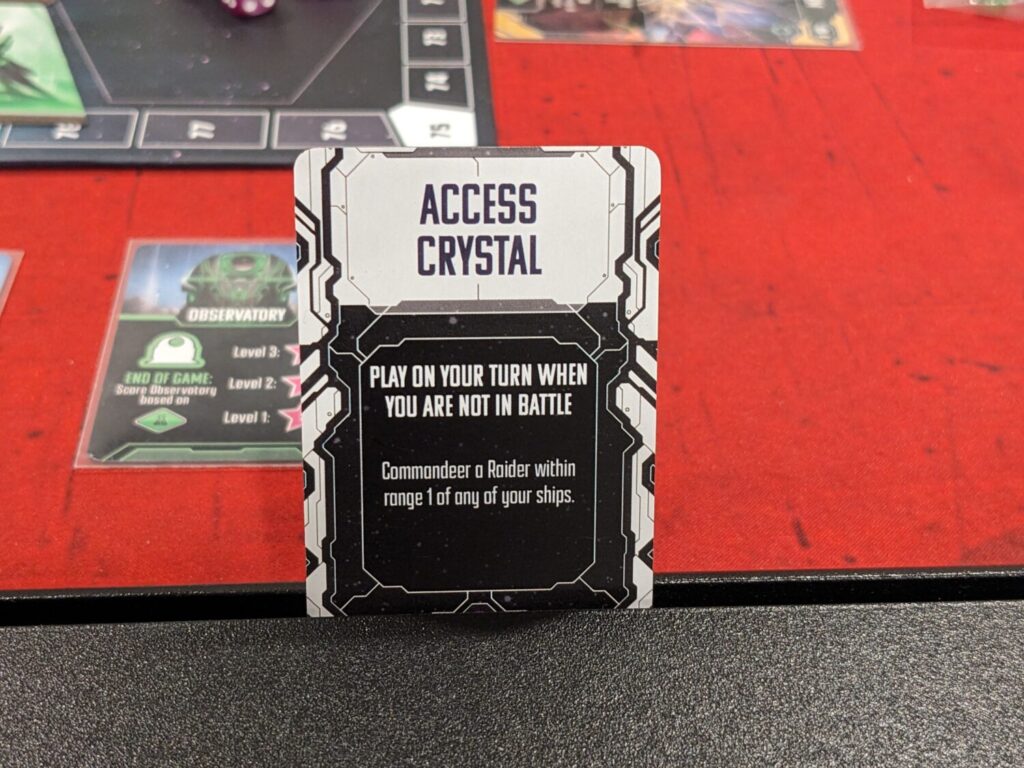
Commandeering Raiders
It’s the ability that many of us dreamed of, especially if you have played Dwellings of Eldervale: when will Andromeda’s Edge let me take control of the Raiders?
That time is now. Some Exotech cards let a player commandeer a Raider. And not just the piddly S-Class Raiders, either…any of them. In one of my games, I took control of the D-Class Mortality Sphere. Friends, you haven’t lived until you have commandeered the Mortality Sphere to wreak havoc on an opponent.
Commandeering a Raider isn’t something that lasts for only a turn, either. I had control of the Mortality Sphere for a few turns, using it to disrupt plans all over the board until someone took it out. Managing Raiders is as easy as placing a small token around the base of a Raider under your control, and there’s a sheet in the rules that details any behavior changes that surface with new Raiders. Saving the Exotech commandeer cards for just the right moment—just like the proper use of a Tactics card—is a fun decision that might turn the tide in your favor if played correctly.
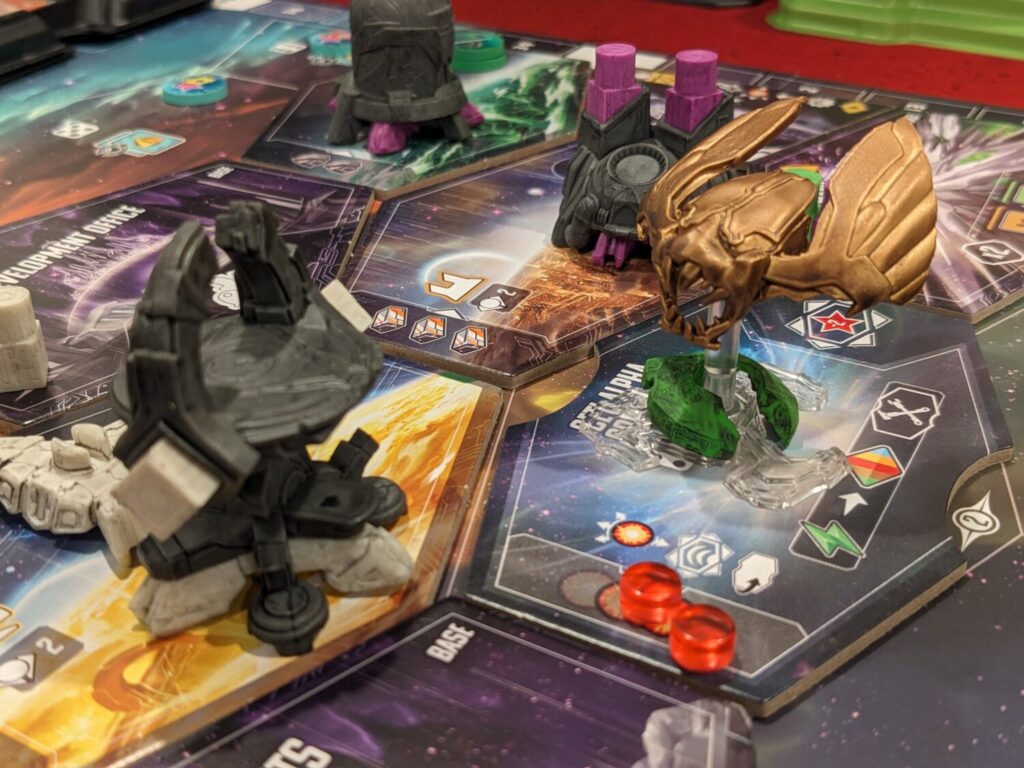
New Raiders
Genesis comes with two new Raiders: the Cube, and the Cosmic Frog, although it’s not the same Cosmic Frog you might be thinking of.
The Cube has an interesting attack mechanism: it doesn’t roll any dice. Based on a grid printed on the Cube’s C-Class Raider card, its results are static, so players know what they need to take it down. The Cosmic Frog will remind players who have played the (completely separate in every way) board game of what makes it so special—the Cosmic Frog in Andromeda’s Edge: Genesis has gobbled up four modules from the game’s four tracks, and each time it is defeated in battle, the winner gets to take a free module from its B-Class Raider card. It’s a funny concept…or, at least it’s a funny concept until it beats you in battle!
I like that the game has more toys to play with, but I personally loved the Raiders from the base game. If anything, having more options is nice. However, I can’t say that these two new Raiders are the main reason to buy this expansion.
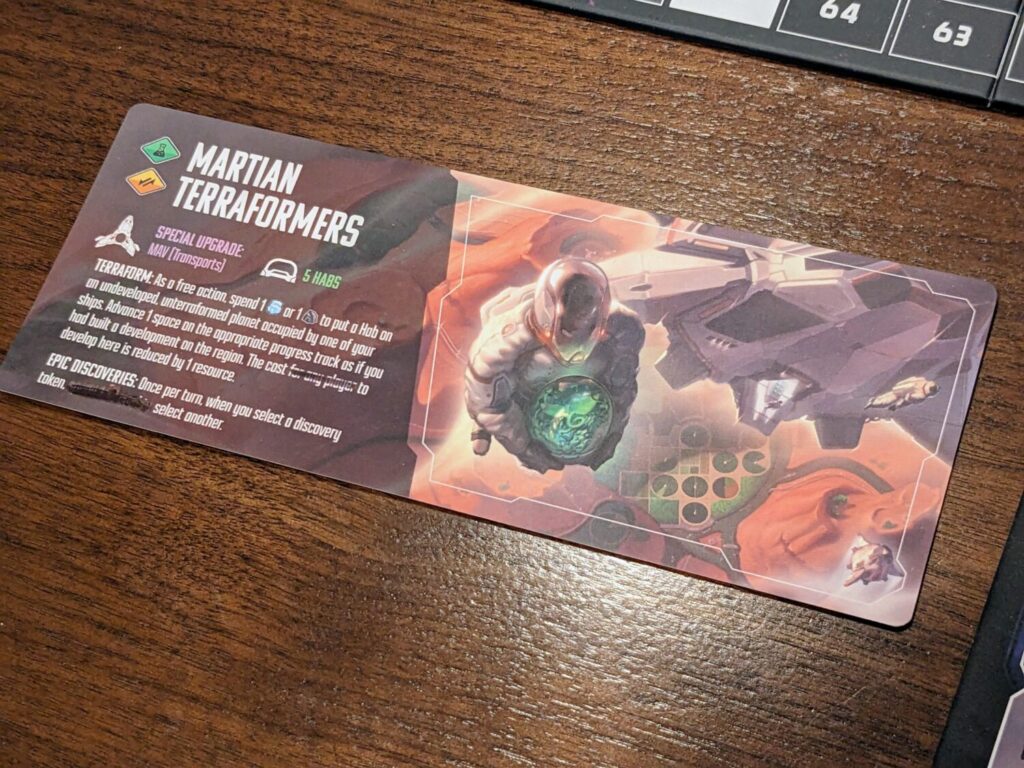
New Factions
The all-in deluxe version of Andromeda’s Edge comes with 18 different factions. For me, that was enough. More than enough, especially because I haven’t played Andromeda’s Edge 18 times yet. But three new factions are included in Genesis, and I love the way each new faction affects the overall state of play.
The new factions are the Martian Terraformers, the Precog Hybrids, and the Wood Whisperers. And, while I can’t figure out why I like the idea of tree people flying battle cruisers around space, I have to admit that the Wood Whisperers are my favorites of the three included factions. That’s because their power is crazy fun—whenever the Whisperers repair something, the damage token goes to their player mat and becomes available as a wild resource that can act as either an energy or a credit.
During my play with the Whisperers, I found myself intentionally flying into danger with my shielded ships to lose battles. After getting my Tactical Operations bonus for losing a fight, I would later repair damage markers to get access to credits. I took modules with damage markers to repair those and later turn them into credits, too. Embracing damage as a net positive was a fun way to approach an existing system that I know well, so this became a nice example of the ways games adapt with a new expansion.
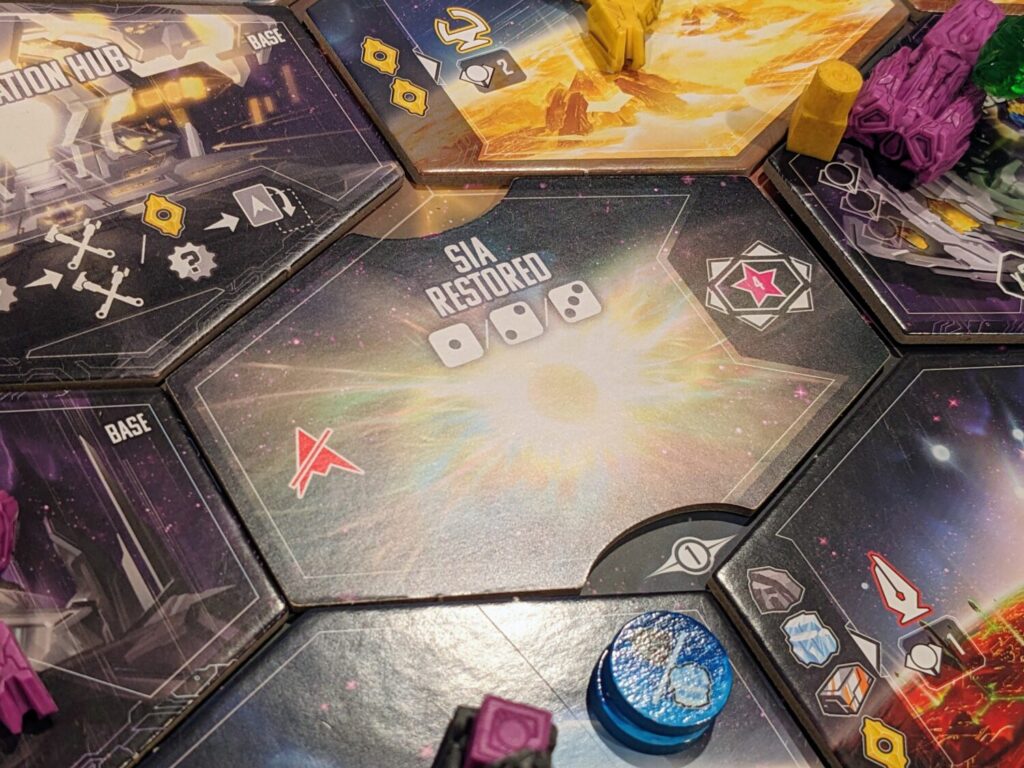
More, More, More
There are a number of other smaller additions that, while nice, will likely get the love mainly in the form of, “hey, here’s a bunch of other stuff.”
Andromeda’s Edge: Genesis offers new development cards. When a player puts a development onto the main board (these are the large plastic toys that you insert a transport into, along with any leaders used to build the development), that player gets a bonus card that will score at the end of the game. In Genesis, players now have access to more choices when a development is made, in the form of new one-time-per-game powers that I think are a little better than the ones in the base game.
The nice thing about this addition? Players can still choose from the base game power for, say, building a City, or one of the three different options instead. Most of these add-ons are juicy, so I already know these will take preference over the base-game options.
There are new event cards that grant all players a bonus when taking certain actions until the next event card is revealed. There are “Corrupted Stars” tiles that can be used to boost standing on different tracks as well as offer adjacent developments a boost to their end-game score value. Shrines are new half-tiles that fill in the four spaces on the left- and right-hand edge of the board, to again boost the value of developments once players take certain actions to activate their end-game effects.
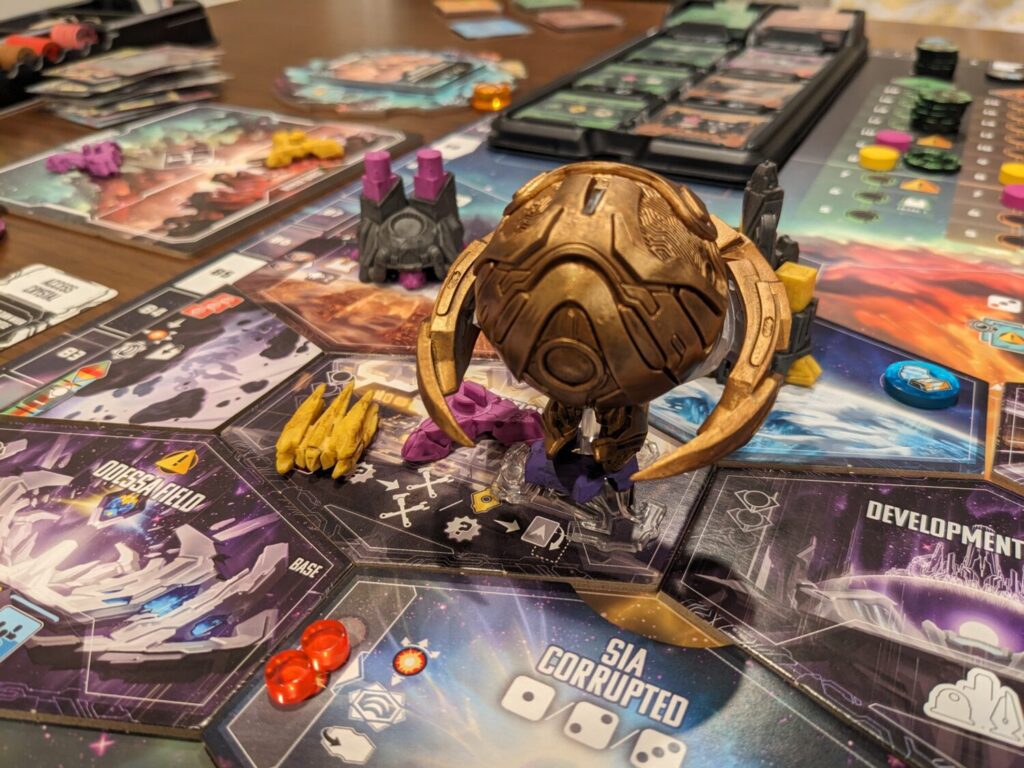
Is It Essential?
Andromeda’s Edge: Genesis is a great addition to a game that is already bursting at the seams. I already thought the base game was perfect, so extras are just that, at least to me. However, even I have to admit that I didn’t think it would be as thrilling as it was to commandeer a Raider token or pull off some of the shenanigans offered by the new factions. And that was before I defeated the Cosmic Frog to get free modules, or witnessed more of the Exotech cards in action.
In that way, the additions are fun and add to the plethora of setup options one has with this game. I am honestly thankful that new modules were not added, because I think the deluxe edition already has too many. (I know, I know…”too many” means “just the right amount” to many of us superfans. I get it!)
“Hey, I heard you are doing plays of the new expansion. Is it essential?” A friend posed this question after I shared that I picked up the prototype at Gen Con. I’ve been thinking about this quite a bit…do I really need more content for a game that takes up a full cube of the Kallax in my basement?
I’ll offer two answers. If you really have exhausted the stuff in the base game’s deluxe edition box—played it 20+ times, used all the factions, want more Raider options, or just love the idea of commandeering a Raider—then, yes, Andromeda’s Edge: Genesis IS essential. It offers just enough new stuff to help get the base game back to the table with some extras that are a lot of fun to put to work.
If you are looking for a really distinct new way to play the base game, Andromeda’s Edge: Genesis is not essential. This is absolutely a “more is more” expansion that doesn’t change much of the way the original game plays, in my estimation. Some people in my network bought the all-in edition then played it once or twice. For those people, I would recommend spending more time with the base game, in part because it is a wonderful system but also because the value proposition for the first game is sensational. There is so much in the box—so many different ships, so many different modules, three different event decks, a shocking array of different factions.
When I think of games like Terraforming Mars, the base game didn’t shine for me until it offered Prelude. When Prelude arrived, Terraforming Mars hit my table all the time. Genesis doesn’t do that for Andromeda’s Edge, in part because Andromeda’s Edge didn’t need something like that to shake up the meta. Every game is already quite different, and I didn’t think the system needed any major overhauling. Thankfully (for me), Genesis doesn’t really change the way the core system plays…but it does provide a handsome array of more stuff.
I hope that helps. As a junkie myself, I hope this will tempt you to visit the game’s expansion crowdfunding campaign page on September 9th to add Andromeda’s Edge: Genesis to your collection. Now, if you’ll excuse me, I have an intergalactic frog to tame!


